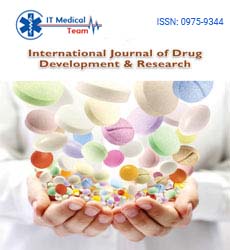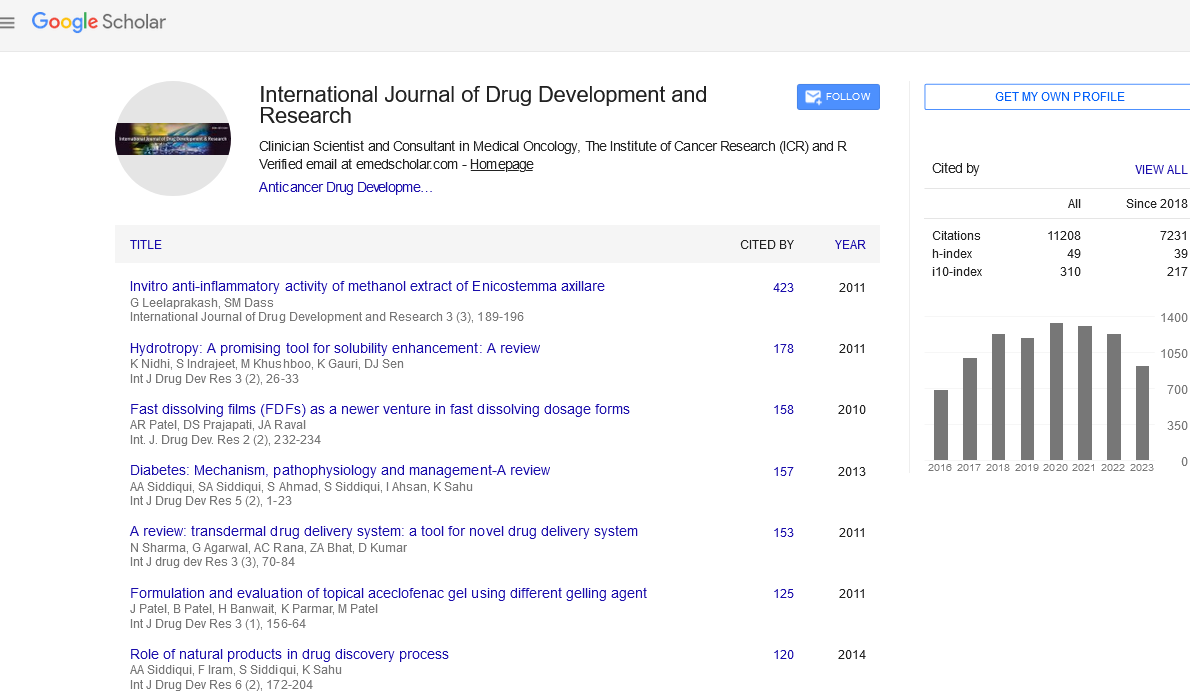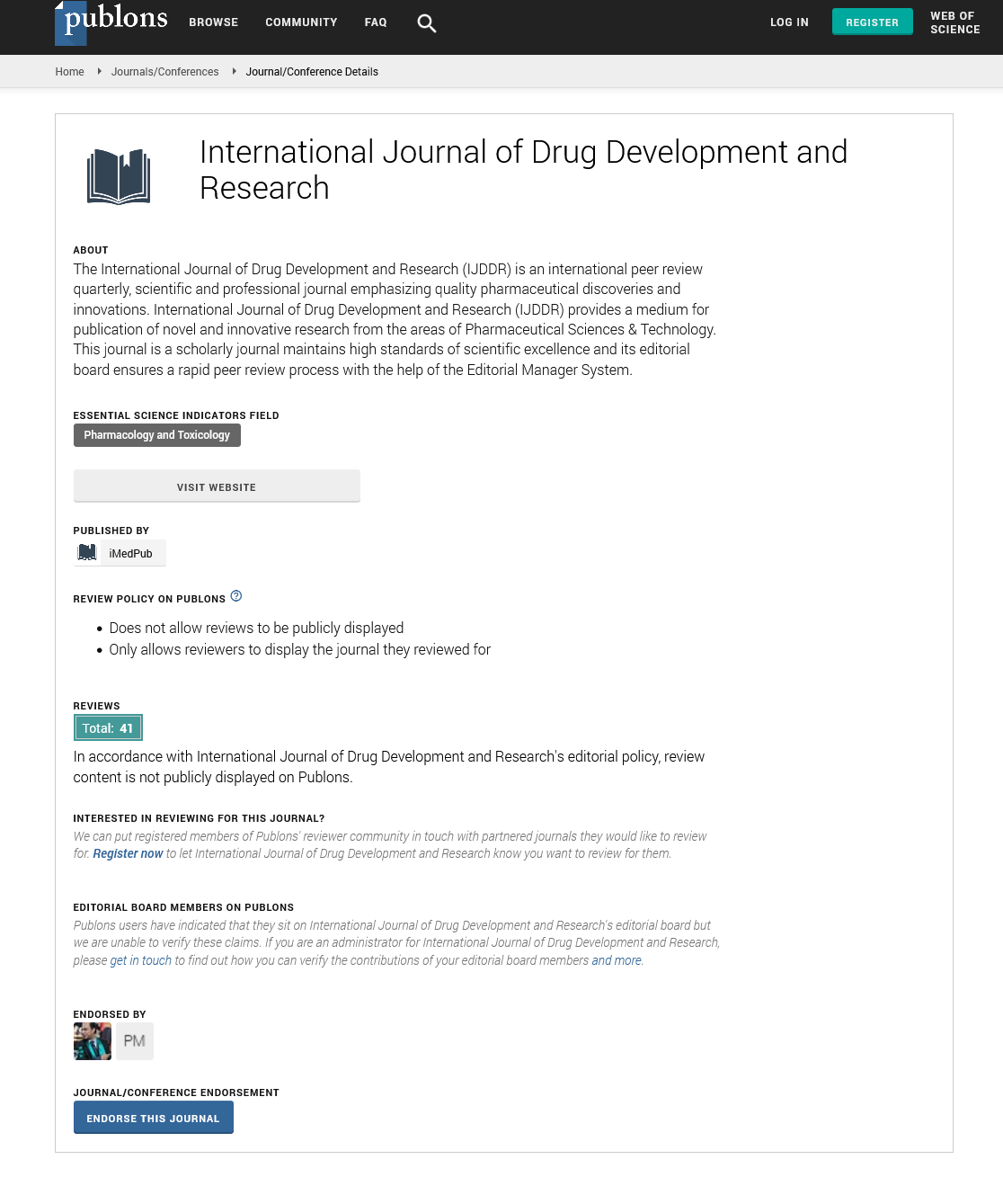Perspective - (2024) Volume 16, Issue 3
Transformative Role of Biotechnology in Drug Development
Alson Bakwr*
Department of Biotechnology, University of Tirana, Tirana, Albania, Albania
*Correspondence:
Alson Bakwr, Department of Biotechnology, University of Tirana, Tirana, Albania,
Albania,
Email:
Received: 09-May-2024, Manuscript No. IJDDR-24-14789;
Editor assigned: 13-Jun-2024, Pre QC No. IJDDR-24-14789 (PQ);
Reviewed: 27-May-2024, QC No. IJDDR-24-14789;
Revised: 03-Jun-2024, Manuscript No. IJDDR-24-14789 (R);
Published:
11-Jun-2024
Introduction
In the realm of modern medicine, biotechnology stands as a
cornerstone, propelling the boundaries of drug development
beyond conventional limits. Its fusion of biology and technology
has revolutionized how researchers identify, create, and deliver
life-saving therapies. This article delves into the intricate web of
biotechnological innovations, unravelling their pivotal role in
shaping the landscape of drug development.
Description
Understanding biotechnology in drug development
Biotechnology encompasses a diverse array of techniques and
methodologies harnessed to manipulate biological systems for
medicinal purposes. At its core lies genetic engineering, where
scientists modify living organisms at the molecular level to
produce desired therapeutic agents. One of the most prominent
applications of biotechnology in drug development is the
production of recombinant proteins, such as insulin and growth
factors, using genetically engineered microorganisms or cell
lines.
Advancing drug discovery
In the quest for novel therapeutics, biotechnology serves as a
beacon of hope, offering innovative approaches to drug
discovery. High throughput screening, a biotechnological
method, allows researchers to rapidly test thousands of
compounds for their potential pharmacological activity,
expediting the identification of promising drug candidates.
Furthermore, computational biology and bioinformatics play a
crucial role in analyzing vast biological datasets, unraveling
intricate molecular pathways, and predicting drug-target
interactions with unprecedented accuracy.
Targeted therapies and personalized medicine
Biotechnology has paved the way for a paradigm shift in drug
development, moving from a one-size-fits-all approach towards
personalized medicine. Through genomic analysis and molecular
diagnostics, researchers can identify genetic biomarkers
associated with specific diseases, enabling the development of
targeted therapies tailored to individual patients' unique genetic
makeup. Monoclonal antibodies, engineered using biotechnological
techniques, exemplify this personalized approach by selectively
targeting disease causing molecules while sparing healthy cells.
Revolutionizing drug delivery systems
The journey of a drug from formulation to delivery is often
fraught with challenges, including poor solubility, limited
bioavailability, and off-target effects. Biotechnology offers
innovative solutions to these obstacles by designing
sophisticated drug delivery systems tailored to optimize
therapeutic efficacy and patient compliance. Nanotechnology,
for instance, facilitates the encapsulation of drugs within
nanoparticles, enhancing their stability, targeting specificity, and
controlled release kinetics. Similarly, gene therapy harnesses
biotechnological tools to deliver therapeutic genes into target
cells, offering potential cures for genetic disorders and chronic
diseases.
Navigating regulatory landscapes
As biotechnological innovations continue to redefine the
boundaries of drug development, regulatory agencies face the
daunting task of ensuring the safety, efficacy, and quality of
emerging therapies. Striking a delicate balance between
fostering innovation and safeguarding public health, regulatory
frameworks must adapt to the dynamic nature of biotechnology-driven advancements. Close collaboration between scientists,
industry stakeholders, and regulatory authorities is imperative to
streamline the regulatory approval process and expedite the
translation of cutting-edge biotechnological discoveries into
clinically viable treatments.
Addressing global health challenges
Biotechnology holds immense promise in addressing pressing
global health challenges, from infectious diseases to cancer and
beyond. Vaccines, a quintessential biotechnological
achievement, have played a pivotal role in eradicating deadly
pathogens and curtailing infectious disease outbreaks.
Moreover, biopharmaceuticals, including therapeutic proteins,
monoclonal antibodies, and nucleic acid-based therapies, offer
novel avenues for combating cancer, autoimmune disorders, and
rare diseases with unmet medical needs. Collaborative efforts on a global scale are essential to harness the full potential of
biotechnology in tackling health disparities and promoting
equitable access to life-saving treatments worldwide.
Conclusion
In the ever-evolving landscape of drug development,
biotechnology stands as a beacon of innovation, driving
transformative changes that hold the promise of a healthier future.
From accelerating drug discovery to enabling personalized
medicine and revolutionizing drug delivery, its profound impact
reverberates across every facet of modern healthcare. As we
navigate the complexities of the biotechnological frontier,
collaboration, transparency, and ethical stewardship remain
paramount, ensuring that the fruits of biotechnological
innovation are harnessed responsibly for the betterment of
humanit
Citation: Bakwr A (2024) Transformative Role of Biotechnology in Drug Development. Int J Drug Dev Res Vol:16 No:3






